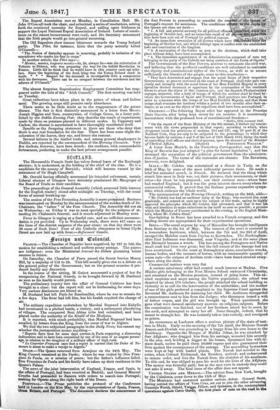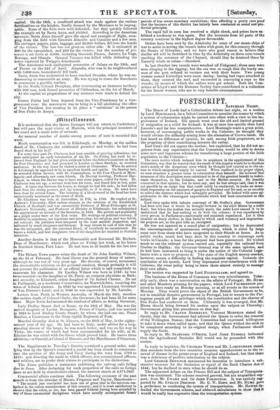jortign anti (Colonial.
FittscE.—The Chamber of Deputies have negatived, by 187 to 162, the motion for establishing a reduced and uniform penny postage. The papers are indignant; even the Ministerial Journal des Debate promising better success in future.
On Saturday, the Chamber of Peers passed the Secret Service Money Bill, by a majority of 112 to 22. This bill usually gives rise to a debate on the general policy of the Government; but on the present occasion it pro-. duced hardly any discussion.
In the hoarse of the -sitting, M. Guizot announced a project of law for reorganizing the National Guards, to be brought forward by M. Duchatel as soon as his health would permit.
The preliminary inquiry into the affair of General Cubieres has been brought to a close: but the report will not be forthcoming for some days. Very curious disclosures are hinted at.
M. Duchatel had left Paris for Rambouillet, where he was to remain for a few days. The fever had left him, but his health required the change of air.
The military expedition undertaken by Marshal Bugeaud into Kabylia had terminated in a pitched battle, a victory, and a subsequent plundering of villages. The conquered Beni Abbas tribe had submitted, and been placed under the authority of the Khalif of the Mudjana. It is reported, with much probability, that Marshal Bugeaud had been recalled, by letters from the King, from the scene of war to Algiers. We find the two subjoined paragraphs in the Daily News; but cannot say whether the juxtaposition means anything- " Reports have been for some days current in Paris respecting a distressing indiscretion said to have been committed by one of the sous of an august person- age, in relation to the daughter of a military officer of high rank. Le Courtier Francais says that a report is current that the Duke of Ne- mours is about to make a voyage to Algeria.'
Ss...atm—The Queen returned from Aranjuez on the 24th May. The King Consort remained at the Pardo; where he was visited by Don Fran- cisco de Paula, on a mission of peace; but the father's influence failed. Don Francisco de Paula and his family have taken up their residence in the Queen's Palace.
The news of the joint intervention of England, France, and Spain, in the affairs of Portugal, had been received at Madrid; and General Manuel Concha had proceeded to Zamora with orders to march into Portugal; making for Oporto along the right bank of the Douro.
PORTUGAL—The Presse publishes the protocol of the Conference held in London on the 21st May, by the representatives of Spain, France, Great Britain, and Portugal. The document declares the concurrence of the four Powers in proceeding to consider the re Portugal's request for assistance. The conditions the Queen are then set forth- " 1. A full and general amnesty for all political offen beginning of October last, and an immediate recall of all
time have been sent out of Portugal for political reasons. 411Z "2. An immediate revocation of all decrees which have bMX.
beginning of October last, and which infringe upon or conflict with the established laws and constitution of the kingdom. " 3. A convocation of the Cortes as soon as the elections, which shall take place without delay, have been accomplished. " 4. The immediate appointment of an Administration composed of men not belonging to the party of the Cabrals nor being members of the Junta of Oporto."
The Governments of the four Powers, anxious to terminate the civil war, and believing that the proffered conditions are well calculated to maintain the dignity and constitutional rights of the Crown, as well as to secure sufficiently the liberties of the people, come to this conclusion- " They have determined and engage that the naval forces of their respective Governments, at present stationed on the coast of Portugal, shall take part con- jointly and instantly with the naval forces of her Most Faithful Majesty in every operation deemed necessary or opportune by the commanders of the combined forces to attain the object of this common act; and the Spanish Plenipotentiary engages, moreover, that a body of troops, of which the number shall be fixed be- tween the Governments of Spain and Portugal, shall penetrate into Portugal, in order to coOperate with the troops of her Most Faithful Majesty, and that those troops shall evacuate the territory within a period of two months after their en- trance, or as saon as the object of the expedition shall have been accomplished.",
GERMANT.—The following Royal edict has appeared in the Prussian State Gazette, after being kept secret fur six months: it is monstrously Inconsistent with the professed love of constitutional freedom- .. Berlin, 29th January 1847.
"On the report of the State Ministry of the 8th instant, I declare my concur- rence with the views propounded in that report; according to which, when clergymen break the provisions of sections 214 and '227, cap. 20 part II. of the National Code, they are only to be subjected to the proceedings to which they become liable by sections 5 and 9 of the law of 24th March 1844, fixing the mode of controlling civil officers and clerical persons, upon the demand of the Minister of Clerical Affairs. (Signed) FREDERICK WILLIAM."
A letter from Munich, in the Nuremberg Correspondent, says that the King of Bavaria has just adopted "a plan for future legislation "; and has arranged the separation of the political government from the administra- tion of justice. The terms of the statement are obscure. The Bavarians, however, were delighted.
• ITALY.—Mr. Cobden was entertained at a dinner in Turin, on the 24th of May, by some of the most influential persons there. He made a brief but animated speech, in French. He declared that the thing which struck him most in Italy was, not their pictures, their monuments, or their ruins—for those he was prepared; nor their eminent men—whose fame had reached England; but it was the great interest shown everywhere for commercial reform. It proved that the Italians possess expansive sympa- thies which embrace the whole world.
The correspondent of the Morning Chronicle, writing on the 26th, adds-
" Mr. Cobden has had an audience today of the King; who received him most graciously, and entered at once upon the subject of free trade, saying he highly approved the principles which Mr. Cobden had advocated, and that it was his wish and intention to make reductions in the tariff as soon as possible; a promise which the Minister of Finance corroborated in the evening, at the English Minis- ter's, where Mr. Cobden dined."
Gas-lighting in Rome has been awarded to a French company, and five leading streets are appropriated for their experimental operations.
INDIA.—The usual express by way of Marseilles has brought intelligence from Bombay to the 1st of May. The interest of the news is centered in a tremendous hurricane, which, between the 7th and the 22d of April, ravaged the Malabar coast from Ceylon to Kurrachee. The Buckingham- shire East Indiaman was dismasted, near Vingorla; and at the same place the Mermaid became a wreck. The loss among the Portuguese and Native small craft had been very great; but the full extent of the damage had not been ascertained. On the coast at Rutnagherry alone, numberless wreeles, human bodies, and the carcases of horses, with an innumerable quantity of cocoa nuts—the cargoes of Arabian craft—have been found strewed every- where along the shore.
Commercial matters were very flat.
A curious missionary affair had created much interest at Madras. Five Hindoo girls belonging to the Free Mission School embraced Christianity, and remained on the Mission premises, instead of going home. This ex- cited suspicion and anger among the Native population; the school was deserted by about 170 scholars; the people attacked the school-building so violently as to call for the intervention of the authorities; and the mother of one of the girls preferred a complaint to the Supreme Court against the Reverend Mr. Anderson for detaining her child. Mr. Anderson disregarded. a remonstrance sent to him from the Judges; who thereupon issued a writ of habeas corpus, and the girl was brought up. When questioned, she gave what were deemed satisfactory answers on religious subjects. Before the examination was finished, one of her brothers seized her in court, by the neck, and attempted to carry her off. Some thought, indeed, that he meant to strangle her. He was instantly taken into custody, and consigned. to prison. An occurrence at Lucknow offers a curious picture of the state of mat- ters in Oude. Early on the morning of the 7th April, the Minister Nawab Ameen-ood-Dowlah was proceeding in a buggy from his own house to the Residency. Opposite the Mosque of Mulika Jehan, he was attacked by four Affghans; who dragged him from his carriage, wounded him severely in the arm, and, holding a dagger at his breast, threatened him with 'in- stant death, unless he paid them 50,000 rupees and also guaranteed their lives against the consequences of the outrage. The assembling bystanders were kept at bay with loaded pistols. The Nawab had acceded to the terms, when Colonel Richmond, the Resident, arrived; and endeavourea to restore order, and free the Nawab from the clutches of his assailants- To this end, he was obliged to pass his word for the lives of the Affghans. The money was formally paid; but as the men were in custody they could not take it away. The final issue of the affair does not appear.
UNITED STATES AND MEXIC0.—The advices from New York, brought by the Caledonia, come down to the 15th of May.
The Mexicans had sustained another serious defeat. General Scott, having settled the affairs of Vera Cruz, set out to join the other advancing Generals Worth, Shield, Twigge, Pillow, and Quitman, in the contemplated operations against Cerro Gordot the first place of note on the road to the tapitaL On the 18th, a combined attack was made against the various fortifitatinns on the heights, fondly deemed by the Mexicans to be impreg- nable.. Some of the forts were well defended; but they quickly followed the example set by Santa Anna, and yielded. According to the American 'accounts, Santa Anna himself gave the signal and example of flight, esca- ping from the field with Generals Almonte and Canalize and a few men. His carriages, papers, plate, baggage, and 20,000 dollars, fell into the hands of the victors. The loss was not great on either side. It is estimated at 300 for the vanquished, and 250 for the victors; but the number of pri- soners is set down at 6,000, including Generals Pinson, Jarrero, La Vega, Norrega, and Obando. General Vasquez was killed while defending the tower captured by Twiggs's detachment.
The Americans took undisputed possession of Jalapa on the 19th, and of Perote on the 22d of April. Ampudia, who was in its neighbourhood with 3,000 men, immediately fell back.
Santa Anna was understood to have reached Orozaba, where he was en- deavouring to reassemble an army. He was trying to rouse the Rancheros to commence a guerilla warfare.
In the North, Colonel Doniphan, after overrunning an immense territory with 900 men, took formal possession of Chihuahua, on the 1st of March.
At the capital no preparations of any moment were made to defend the city.
Gomez Ferias had been deposed from the Vice-Presidency by a Con- gressional ruse: the manceuvre was to bring in a bill abolishing the office of Vice President but creating in its place a "substitute" in the person of Don Pedro de Anaya.

























 Previous page
Previous page